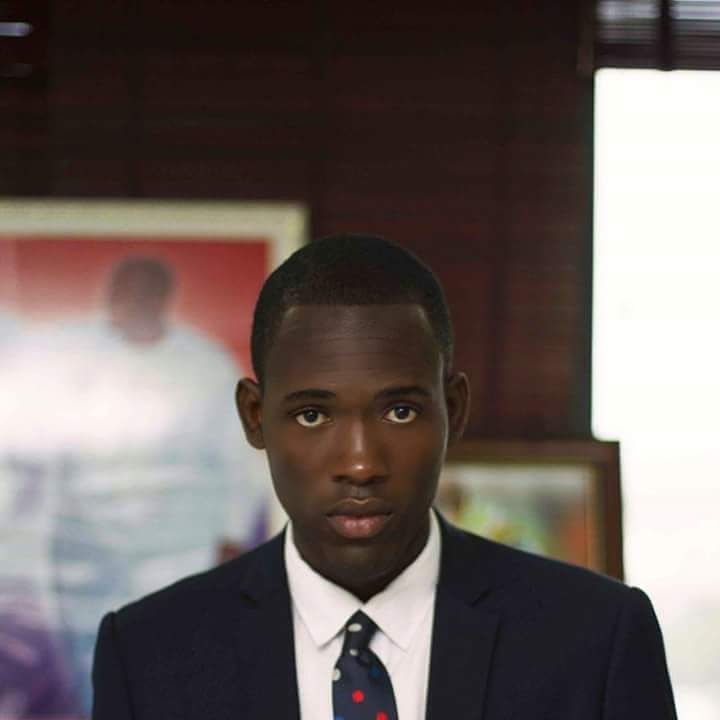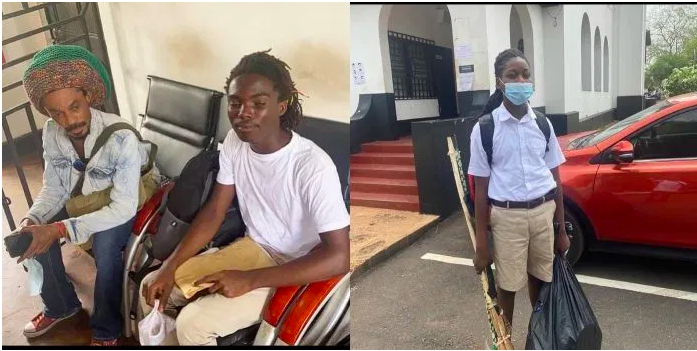I have read your article titled ‘It is the beggar’s belief that Human Rights are absolute’. You accuse Ghanaians of being driven by sensationalism in the ongoing discussions on the Achimota saga.
Like it is becoming commonplace in our society, you label the justified intellectual scrutiny of Achimota’s conduct as ‘incessant attacks.’
If I could dare advise as a brother, your core duty in the profession you seek, as we have learned, is not to your personal views or opinions or even the instructions of your client but the administration of justice and the rule of law.
It does not further that duty when those vested with legal knowledge and skills engage in the superficial analysis you did. The danger is that your conduct, cloaked in the title of a final year law student has a clear potential of misleading members of the public who do not have the advantage you have.
In your article, you conflated subjective opinions, wishes and fantasies with authority. And where you did rely on authority, it was either not applicable or entirely misplaced in the construction you placed on it.
You missed the matters in issue both on a factual and legal basis.
First, there is no doubt Ghana's Constitution 1992 not only guarantees a right to freedom of religion and a right to freedom of thought, belief and conscience but also goes as far as to guarantee the right to adopt any ‘culture or tradition’ and manifest such adoption openly. Article 21(1) (b), (c) and Article 26.
These rights were granted and guaranteed to ensure the vision of a just and free society made up of a diversity of peoples and cultures.
Of course, as in the case of any rights granted under social contract in the formation of a State, these rights can be limited where there is a clear public policy basis to do so.
Such limitations must have a clear public policy purpose and the proposed end must be reasonable in achieving that objective. See People’s Popular Party v Attorney-General [1971] 1 GLR 138.
The wording of the provisions of Arts 21(1)(b), (c) and Article 26 is like the provisions of Article 9 of the United Kingdom's Human Rights and Article 9 of the European Convention on Human Rights. It is helpful upon the principle of common-law to consider how their Courts have dealt with matters relating to the interpretation of ‘their’ Article 9.
Where the State attempts to curtail or limit the right to religion or its manifestation, the English and Strasbourg Courts' approach has been to test.
a) Whether the faith is genuinely held as a religious faith and
b) Whether the conduct in question is a material aspect of the faith. See Regina v. Secretary of State for Education, Employment and others ex parte Williamson and others [2005] UKHL 15.
Where the answer to both is in the affirmative, the conduct in question AUTOMATICALLY becomes unlawful and must be justified on a clear public policy basis.
That approach is the approach taken when the need to limit rights is engaged. It is not peculiar to the United Kingdom but finds expression in American jurisprudence under the three distinct levels of scrutiny of judicial review.
In Ghana, our Courts signaled this approach long before some of her peers, per the distinguished Taylor J, as he then was in People’s Popular Party and consistently applied. See Ghana Independent Broadcasters Association v Attorney General and Another [2017] GHASC 45.
Regarding the Achimota saga, the matter in issue is not whether Rastafari qualifies as a religion. There is a consensus amongst religious scholars it does. But even if it were not, there is no doubt there is an evident ‘culture’ or ‘tradition’ of wearing dreadlocks amongst some peoples.
The question then engaged is what public interest objectives warrants preventing these people from assessing certain public services while still wearing their locks.
It is also essential to be clear that issues relating to human rights are fact-specific. And so, while there may be a rational public policy basis to ban people with particular looks and features from the security services or some aspects of it with ease, it becomes difficult to apply the same stroke when considering matters such as access to education.
Because how a person looks shouldn’t generally matter to his education. The State has set a limit as to what it finds offensive ‘looks’ in its public orders offenses laws and any other disapproval is a matter of conscience not law.
Thus, the remedy for those who find someone's entitled looks offensive is to appeal to their conscience and not use brute force or law.
And the issues also have nothing to do with personal liberty. Personal liberty in the sense of our jurisprudence is not about free will: weirdly just free movement.
The tenor of Article 14 is clearly about protecting individuals from arbitrary arrests. Paragraph 145 of the Report on the proposals for a Draft Constitution presented to the PNDC.
The question is whether Achimota School or her mother, the GES, has provided a clear and rational basis to justify the ban. On that basis, the argument about floodgates, which, to be fair to you, you do not make but has arisen from some quarters, ought to be addressed.
Assuming the floodgates would be opened as claimed if dreadlocks were to be allowed, then, simply put, what can be wrong with that?
What can sensibly be wrong with encouraging a society where we play out the beauty of our cultural and other diversities with conflict?
What can sensibly be wrong with projecting a Ghana where the Rasta sits in class with a Hijab-wearing Muslims whose best friend is either an atheist, rosary wearing catholic or a turbaned Sik?
How can such a society be wrong, I ask? And how can we get such a community if we do not remove the neo-communist shackles turning our schools into soulless gatherings of uniformed uniforms?
Because if there is anything wrong with that, then it is our nation's vision that is wrong. It is the vision of a Ghana of different peoples and culture that is wrong. And since that cannot be wrong, there can be nothing wrong with allowing the so-called floodgates.
And so, the burden on Achimota to justify the ban is clear and pressing. It is something they have not done.
The reality is that we have received no such justification. So, we cannot test whether there would be sensible alternatives other than a ban from admission. And that is problematic conduct for public administrative bodies to engage in. It potentially violates the expectation and standard duty of care imposed on them under Articles 23 and 296.
Therefore, you will find it understandable when I see your approach as both weird and wrong. The issue, in your eyes, has become one where the victim is being asked to justify why he wants to wear dreadlocks even though he has a right to.
He is being asked to explain why he should be admitted into Achimota College even though he has met all criteria published and relevant to admission as a public citizen. He is being asked to justify his human rights against an institutional convention. And that does not take any legal sense with respect to those advancing such a line of thought. That is putting the legal cart before the horse at best.
It gets even more curious when absent of any clear justification from Achimota School when you conclude ‘the justifiable discrimination passes the proportionality test': the question your statement begs is what precisely that discrimination is proportionate to?
What measure is it intended to achieve and against what? How do you measure a ban on admission against an alternative such as making the student a day student valid against those objectives?
When none of that has been done, legal sophistry appears to conclude the test has been passed. And that is why you had to end up justifying your conclusion on the faulty construction of personal liberty.
Public Interest
In the end, you fall on public policy, but again, what is the public policy question here? I have been struggling to get it. What is the public policy rationale to ban dreadlocks?
To make us look more faithful to colonialization, to turn our ancestors in their graves by saying yes, those who called you barbaric for your looks and enslaved you were right. Dreadlocks are always indecent.
How can a people so look down on their selves? How!

***
Author:
Kofi Opare Hagan
Nottingham Law School
Latest Stories
-
Coconut Grove Beach Resort marks 30 years of excellence with memorable 9 lessons & carols service
4 minutes -
WAFU B U-17 Girls’ Cup: Black Maidens beat Nigeria on penalties to win inaugral tournament
49 minutes -
Real Madrid beat Sevilla to keep pressure on leaders Atletico
2 hours -
Liverpool put six past Spurs to go four points clear
2 hours -
Manchester United lose 3-0 at home to Bournemouth yet again
2 hours -
CHAN 2024Q: ‘It’s still an open game’ – Didi on Ghana’s draw with Nigeria
2 hours -
CHAN 2024Q: Ghana’s Black Galaxies held by Nigeria in first-leg tie
3 hours -
Dr Nduom hopeful defunct GN bank will be restored under Mahama administration
4 hours -
Bridget Bonnie celebrates NDC Victory, champions hope for women and youth
4 hours -
Shamima Muslim urges youth to lead Ghana’s renewal at 18Plus4NDC anniversary
5 hours -
Akufo-Addo condemns post-election violence, blames NDC
5 hours -
DAMC, Free Food Company, to distribute 10,000 packs of food to street kids
6 hours -
Kwame Boafo Akuffo: Court ruling on re-collation flawed
6 hours -
Samuel Yaw Adusei: The strategist behind NDC’s electoral security in Ashanti region
7 hours -
I’m confident posterity will judge my performance well – Akufo-Addo
7 hours

